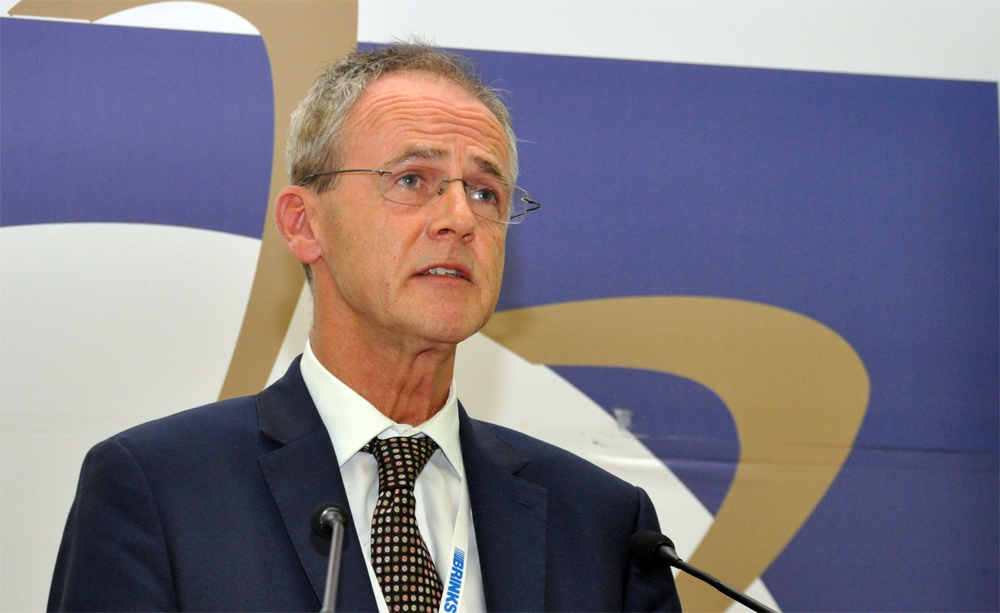Responsible business practices must be at heart of industry’s operations
say Opening Day speakers

ABOVE: Andrew Bone, CEO of the Responsible Jewelry Council, addressing the Opening Session of the 2016 CIBJO Congress in Yerevan, Armenia.
OCTOBER 26, 2016
The second part of the opening ceremony of the CIBJO 2016 Congress featured key jewellery industry figures, including Gemfields President and CEO, Ian Harebottle; ALROSA Vice-President Andrei Polyakov; Responsible Jewellery Council Executive Director Andy Bone; and Responsible Ecosystems Sourcing Platform’s Executive Director Eduardo Escobedo.
Mr. Harebottle spoke about the work of Gemfields, particularly as it relates to ethics, sustainability and transparency. He said that the company’s focus is on growth and development of the sector, and that it prides itself on increasing the supply of coloured gemstones. The supply of sapphires, rubies, emeralds and amethyst has always been only a fraction of the supply to the market of diamonds. The firm is also actively involved in all stages of the coloured gemstone trade, from mining to sorting and distribution to retail.
Mr. Harebottle described ethics, sustainability and transparency as being “at the heart of our work”. He noted that the gemstone industry is not doing enough on these practices, however. “When you spend time in countries where we operate you see that the needs are massive and there is always more to be done,” he commented. “We recognise this and these areas are undoubtedly better for us being there, however, we recognize that we don’t do enough and want to do more.”
He said that although the firm spends about 1 percent of revenue on sustainability programs, this translates into about 20 percent of net income. It also had to be seen in terms of paying taxes, creating jobs, and doing marketing work and that it has a holistic approach to this activity. He commented that it was important for the industry to set high targets.
Key targets for Gemfields are healthcare, education, farming, the environment, its carbon footprint, and elephant and other conservation projects in countries where it operates.
“We work with our downstream participants to ensure they are working ethically – no child labour and that they are paying taxes and other commitments as responsible firms. Disclosure is also critical and we believe that it brings a return on investment,” Mr. Harebottle stated.
Andrei Polyakov, President of the World Diamond Council and Vice President of ALROSA, spoke of the work of CIBJO in bringing together jewellery associations from across the world for many decades. Most sales of jewellery are by small retailers and they are the least protected, he said.
Consumers are concerned with social justice, conflict free diamond jewellery, the origin of precious stones and metals, fair wages, environmental protection and other issues and want to see this reflected in the products, he explained.
“Jewellery retailers are the most important part of the pipeline because of their interface with consumers. That is why CIBJO is so imp for the jewellery industry. It unites the global business. Its work on the Blue Books is critical. Your work in responsible business practices is crucial,” Mr. Polyakov said.
Responsible Jewellery Council Executive Director Andy Bone praised CIBJO for choosing Armenia as the host of the 2016 Congress, saying “CIBJO always goes where the action is and not just to the usual places”.
He outlined the work of the RJC over its 10-year history, saying it had been created by the industry for the industry. “The RJC creates an opportunity for jewellery industry members to set their standards against an industry benchmark,” he stated.
He described the RJC as the only standards organization covering the entire chain from mines to retail and is seeing very large growth rates with the latest large member being ALROSA. There has also been a large rise in RJC certifications. “The benefit of RJC membership is the ‘community of confidence’ along the value chain that it has created,” Mr. Bone stated.
He added that the RJC has 856 members “and hopefully 1,000 by next year,” with members in 66 countries with 400,000 employees
The final speaker of the morning session was Responsible Ecosystems Sourcing Platform’s Executive Director Eduardo Escobedo.
He explained that the Responsible Ecosystems Sourcing Platform (RESP), is a Swiss-based non-profit organization. It is a member-based multi-stakeholder platform composed of premium and luxury companies from the cosmetics, fashion, and jewellery industries, governments and inter-governmental agencies, research institutions, and civil society organisations.
Mr. Escobedo spoke of the need for responsible action in business, pointing out examples in the environmental field where members could take action. “We believe there is still a large gap between what is being done and what needs to be done to help the environment,” he said.
